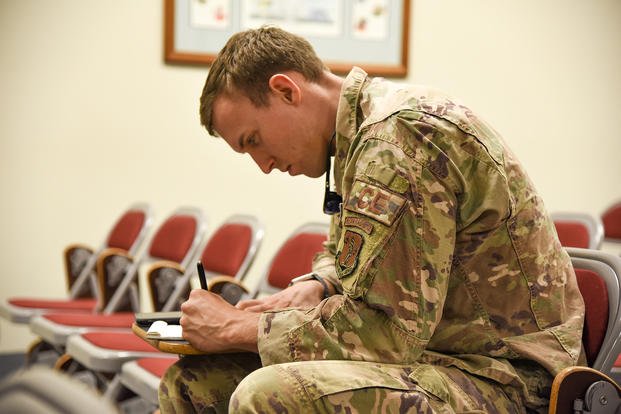To write a successful transition resume, you must first understand the concept of separating your skills, qualifications and experience from the actual environment in which you acquired them; namely, the military. Your goal is to identify and isolate all of your skills, as they relate to your current career goals, and then present them in a manner (e.g., format, wording, style) that a civilian employer can understand.
Often, when all of your skills, qualifications and experience are embedded within your "military career," it becomes difficult for an employer to appreciate them. Your challenge, therefore, is to display those skills prominently without focusing on your record of military service.
Here's an example of how the "transferability-of-skills" strategy works. Both of the following summaries were written for the same job seeker, yet the impression that each leaves is remarkably different:
Related: Does your resume pass the 6-second test? Get a FREE assessment.
"Military Summary"
Ten-year career in food service management with the U.S. Navy. Promoted through a series of increasingly responsible positions managing food service operations for a crew of up to 600. Managed budgeting, procurement, supply, staffing, training and sanitation. Won the Navy's highest award in food service.
"Civilianized Summary"
|
HOSPITALITY MANAGEMENT PROFESSIONAL Ten-year, award-winning professional career in: |
||
| Food Service Operations | Facilities Management | Food Preparation & Presentation |
| Budgeting & Cost Control | Menu Development | Purchasing & Inventory |
| Personnel Training & Leadership | Regulatory Compliance | Customer Service |
See what can be accomplished by changing the wording and presentation just a bit? In the first summary, you "see" a serviceperson. In the second example, where you are leaving the service out of the picture, you "see" a civilian. This is precisely what the "transferability-of-skills" strategy is all about -- changing the perception of "who" you are and clearly communicating the value you offer to a hiring company.
The resume for (the fictional) Larry Michaels is an excellent example of the "transferability-of-skills" strategy in action. It effectively showcases Larry's transferable skills and qualifications, while downplaying the fact that all of his experience was acquired while serving with the U.S. Army. When reviewing his resume, you'd be inclined to think that he had a civilian career -- until you get two-thirds of the way down the page and see that his experience was acquired in the Army.
Related: To apply for jobs that match your skills, visit the Military Skills Translator.
The resume begins with a headline, "Heavy Equipment Mechanic," that immediately identifies "who" Larry is. It then follows with a very brief profile that highlights his number of years of experience and a combination of both his professional skills (e.g., leadership, HAZMAT) and his personal attributes (e.g., reliability, work ethic). It's a snapshot of "who" Larry is and how he wants to be perceived in the civilian market. Note that there is no mention of his military service in this section.
The next section -- and the most important in Larry's resume -- is his "Professional Experience Summary." Rather than including all of this information as part of his work history section (under the "umbrella" of military service), Larry used a format that separates his skills and qualifications from his work history. Each of the bulleted items in this section addresses a different skill, function or achievement, and clearly communicates that he has a wealth of experience in equipment maintenance, repair and inspection, inventory control, budgeting, training and supervision. Again, there is no mention of his military service in this section.
Larry's resume ends with a brief listing of his "Work Experience" (military service record) and his related "Education and Training," all of which are important to include to substantiate where and how he acquired his skills. Throughout his resume, Larry has "painted the picture" of a very well-qualified mechanic (not a "military" mechanic). It is easy for a civilian employer to "see" his skills and how they immediately translate into the civilian workforce.
This same type of resume format, style and presentation is ideal for individuals whose military careers have been in the skilled trades (e.g., mechanics, electricians, maintenance technicians, equipment technicians, equipment operators). It can also be effective for individuals whose careers have been in the same profession and same type of position (e.g., four different accounting positions, all in similar organizations and all with similar responsibilities, so that they can easily be summarized).
The "transferability-of-skills" strategy, however, is effective for every job seeker who is working to transition from a military to a civilian career. Civilian employers are going to glance at your resume and quickly review it. To ensure that it gets the attention it deserves, be certain that your skills, qualifications and experience are prominently highlighted and appropriately worded. No one is ever going to take the time to search your resume for transferable skills. It's your responsibility to showcase those skills and make yourself a part of the civilian community.
Related: For the latest veteran jobs postings around the country, visit the Military.com Job Search section.
Wendy S. Enelow is the author of "Expert Resumes for Military-to-Civilian Transitions."
The Next Step: Get Your Resume Out There
Get your resume seen by companies that are seeking veterans like you. Post your resume with Monster.com.











